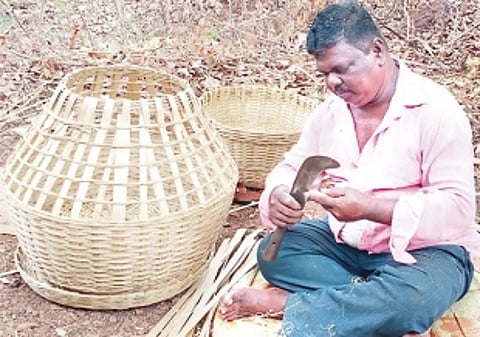

ALDONA: In some pockets of Goa, one can still witness the traditional art of handmade bamboo and cane craft that has been practiced for centuries. The art was introduced by artisans from the Mahar community, who were tasked with weaving ‘patlo’, a cane basket used by fishermen and farmers. Sambaji Mane and his wife Kamal Mane from Aldona are among the few artisans who have been engaged in this craft for over three decades, following their parents' footsteps.
“We have been in this business for many years now. Our parents were doing this and we learned from them. This was the only source of income for the family,” says Sambaji.
The main products created by these artisans include the 'patlo' (cane basket) and 'dalli' (a mat), both of which have a variety of uses. "We make baskets, mats and other designs of bamboo. We keep them on the roadside, and people come to buy them. These products are purchased by fisherwomen, during weddings, and people also buy them to keep things," says Sambaji.
While the use of plastic products has made life easier for many, it has also had a negative impact on the environment. The bamboo craft of the Mahar community offers an eco-friendly alternative that is both sustainable and long-lasting.
The process of making these products may appear simple, but it requires a lot of skill and patience. "Firstly, we need to get a good bamboo and dry it for a day before scraping it well. We then break the bamboo into pieces and dry it in the sun for some time. We also have to take care in cutting it properly so that the basket becomes presentable for the public," explains Sambaji.
Although this art form may seem like a dying tradition, Sambaji is determined to keep it alive. "Our parents did this for more than 50 years, and now we are doing it. We will continue doing it as long as we can. This job does not need schooling or any training. Anyone can do it just by trying to work on it," he says.
However, the younger generation does not share the same enthusiasm. "Our children do not show any interest in this. They feel ashamed of it. They look only in hotels, offices and government jobs. They say there is no business in it, no profit, but only livelihood," says Sambaji.
Despite the challenges, Sambaji and Kamal continue to create their hand-made baskets and other products, which they sell on the roadside to earn a living. "As long as we earn a bit, we do this. There is no option for us for another job. Future generations may not be interested in this craft, but for us, it is our way of life," he says.